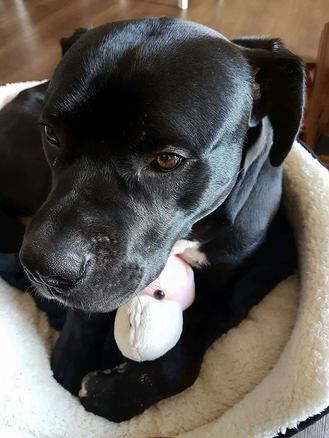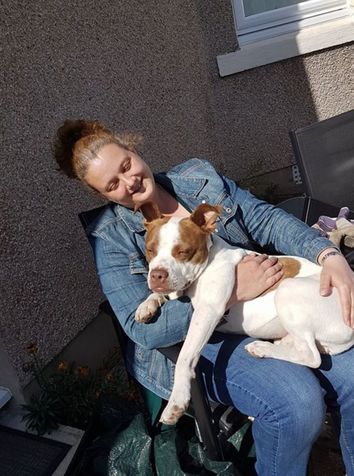WHY FOSTER?

Many rescues, just like ours, rely on foster homes for the dogs we take in. Many dogs, in particular Staffordshire Bull Terriers, do not cope well in a kennel environment.
Fostering allows the dogs to settle into a 'normal' environment and helps them adjust into a home before they are adopted.
Foster families not only provide the tlc and home environment that the dogs need but for some dogs this will be the first time in their lives that they live in a comfortable environment. Many of the dogs require socialisation amongst other dogs, to be assessed around cats, be introduced to walking on lead, toilet training, basic training and taught manners within a home environment. These things are hard, if possible at all, to do if the dog lives in kennels.
Whilst the role of fostering can at times be challenging, the rewards do far outweigh this.
For many, the most difficult part of fostering will be the day it comes to say goodbye. Some dogs are in foster for a few weeks, others may be longer, so you do of course become very attached to the dogs having taken them into your own home and family and many do find their way into your heart.
To these chosen few we have affectionately named them the failed foster club. Some dogs never pass on to another home once settled with their foster families.
It is hard to say goodbye, however without foster homes these dogs would either fail to secure a rescue place and be euthanised or spend considerable time in kennels, in some cases months or years.
Disclaimer: We do not place our dogs in a foster home with any children under the age of 5 and we do not place our dogs in an adopted home with any children under the age of 8 due to the unknown history of the dog's life.
There may be exceptions dependent on if the dog’s history is known. We apologise for any disappointment or inconvenience.
Fostering allows the dogs to settle into a 'normal' environment and helps them adjust into a home before they are adopted.
Foster families not only provide the tlc and home environment that the dogs need but for some dogs this will be the first time in their lives that they live in a comfortable environment. Many of the dogs require socialisation amongst other dogs, to be assessed around cats, be introduced to walking on lead, toilet training, basic training and taught manners within a home environment. These things are hard, if possible at all, to do if the dog lives in kennels.
Whilst the role of fostering can at times be challenging, the rewards do far outweigh this.
For many, the most difficult part of fostering will be the day it comes to say goodbye. Some dogs are in foster for a few weeks, others may be longer, so you do of course become very attached to the dogs having taken them into your own home and family and many do find their way into your heart.
To these chosen few we have affectionately named them the failed foster club. Some dogs never pass on to another home once settled with their foster families.
It is hard to say goodbye, however without foster homes these dogs would either fail to secure a rescue place and be euthanised or spend considerable time in kennels, in some cases months or years.
Disclaimer: We do not place our dogs in a foster home with any children under the age of 5 and we do not place our dogs in an adopted home with any children under the age of 8 due to the unknown history of the dog's life.
There may be exceptions dependent on if the dog’s history is known. We apologise for any disappointment or inconvenience.

Why Do We Need Fosterers?
It is usually the dogs who come to us from the pound that we need foster homes for. These dogs come in all shapes and sizes and many come with a sad story.
We help as many dogs as we can afford to and having more foster homes means that we can help more. Kennel space for each dog per month is £250. If a dog is in foster we can save this money and spend it on other things our dog needs like vet treatment and food, which is also paid for while the dog is in foster.
How Does A Dog End Up In The Pound?
Dogs find themselves in the pound for many reasons: dumped and abandoned and then picked up by the wardens; placed into the pounds when their owners can no longer keep them and provide their care or when families suffer a bereavement. These are just a few of the common reasons.
Sadly we live in a throwaway society that means many dogs are often discarded when they are no longer of value. Many are used to breed and then dumped once no longer useful. This is no more apparent than with Staffordshire Bull Terriers.
Dogs typically in the UK can have only 7 days, many are simply euthanised after this time if not claimed by their owners and sadly there is no government funding for council pounds. The dogs cannot be held indefinitely and without rescue places there is nowhere for the dogs to go once the pound is full.
The other dogs we help rehome are those who cannot stay with their owners (owner surrenders). When we have space we can take them into our care; in most cases the dogs will stay with their owners until we can find a suitable home but in some cases the dogs have to come to us first.
Lastly, the reason our rescue was started was due to the increase in the number of unwanted dogs on Gumtree. We do still help with as many of these dogs as we can. When we can afford to we do take dogs direct from these adverts. In many cases we deal with dogs who have been bought or given for free on Gumtree who cannot be kept as they are unsuitable for their new families
It is usually the dogs who come to us from the pound that we need foster homes for. These dogs come in all shapes and sizes and many come with a sad story.
We help as many dogs as we can afford to and having more foster homes means that we can help more. Kennel space for each dog per month is £250. If a dog is in foster we can save this money and spend it on other things our dog needs like vet treatment and food, which is also paid for while the dog is in foster.
How Does A Dog End Up In The Pound?
Dogs find themselves in the pound for many reasons: dumped and abandoned and then picked up by the wardens; placed into the pounds when their owners can no longer keep them and provide their care or when families suffer a bereavement. These are just a few of the common reasons.
Sadly we live in a throwaway society that means many dogs are often discarded when they are no longer of value. Many are used to breed and then dumped once no longer useful. This is no more apparent than with Staffordshire Bull Terriers.
Dogs typically in the UK can have only 7 days, many are simply euthanised after this time if not claimed by their owners and sadly there is no government funding for council pounds. The dogs cannot be held indefinitely and without rescue places there is nowhere for the dogs to go once the pound is full.
The other dogs we help rehome are those who cannot stay with their owners (owner surrenders). When we have space we can take them into our care; in most cases the dogs will stay with their owners until we can find a suitable home but in some cases the dogs have to come to us first.
Lastly, the reason our rescue was started was due to the increase in the number of unwanted dogs on Gumtree. We do still help with as many of these dogs as we can. When we can afford to we do take dogs direct from these adverts. In many cases we deal with dogs who have been bought or given for free on Gumtree who cannot be kept as they are unsuitable for their new families

What Can I Expect From Fostering?
Whilst a foster home is an unpaid service, we do cover expenses. We supply the food for the dog, or will refund up to £20 per month for this with receipts for anyone who cannot collect food from us. We cover all medical expenses when using one of our approved vets for an authorised visit. Some of the foster dogs may need to have their vaccinations, microchip or neutering done whilst in their foster homes and assistance can be given for transportation where available if the foster is unable to transport to the vets.
When you become a fosterer you are added to our foster group where you can benefit from the advice and experience of other fosterers and our co-ordinators. The co-ordinator looking after the rehoming of the dog will also stay in touch to learn more about the dog's likes/dislikes and general behaviour in the home so we can place the dog in the most suitable adopted home.
Fostering can be done to fit in with you and your life. We have fosters who work full time, those who are retired, many have other pets and children and we assess and match the foster dogs accordingly. All dogs will have had basic assessments before being placed to ensure that the dog will fit in with you and your environment.
Foster homes allow us to further assess the dogs within a home environment which is invaluable. Whilst our dogs are fully insured they must be kept on lead at all times when they are outside your garden (if you have an enclosed garden). You will sign a foster agreement and be given a starter pack which includes some help and advice about common health complaints that can be easily managed without a vet visit and what to do as a fosterer.
Does this sound like something you could do? Please get in touch with us by completing a foster enquiry form and our foster coordinator will aim to be in touch within 7-10 days.
Whilst a foster home is an unpaid service, we do cover expenses. We supply the food for the dog, or will refund up to £20 per month for this with receipts for anyone who cannot collect food from us. We cover all medical expenses when using one of our approved vets for an authorised visit. Some of the foster dogs may need to have their vaccinations, microchip or neutering done whilst in their foster homes and assistance can be given for transportation where available if the foster is unable to transport to the vets.
When you become a fosterer you are added to our foster group where you can benefit from the advice and experience of other fosterers and our co-ordinators. The co-ordinator looking after the rehoming of the dog will also stay in touch to learn more about the dog's likes/dislikes and general behaviour in the home so we can place the dog in the most suitable adopted home.
Fostering can be done to fit in with you and your life. We have fosters who work full time, those who are retired, many have other pets and children and we assess and match the foster dogs accordingly. All dogs will have had basic assessments before being placed to ensure that the dog will fit in with you and your environment.
Foster homes allow us to further assess the dogs within a home environment which is invaluable. Whilst our dogs are fully insured they must be kept on lead at all times when they are outside your garden (if you have an enclosed garden). You will sign a foster agreement and be given a starter pack which includes some help and advice about common health complaints that can be easily managed without a vet visit and what to do as a fosterer.
Does this sound like something you could do? Please get in touch with us by completing a foster enquiry form and our foster coordinator will aim to be in touch within 7-10 days.